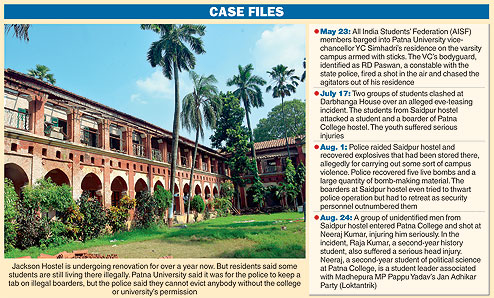Women in Patna feel safer in their city than their counterparts in the national capital do, says a new survey.
The study, which surveyed 2,037 households in Delhi and 1,028 in Patna, was conducted by New Delhi-based Institute of Human Development (IHD) and sponsored by Canada's International Development Research Centre (IDRC) and the UK-based Department For International Development (DFID). It asked the respondents questions related to parameters like crime, living alone at home and sexual assault.
In Patna, 62.5 per cent people felt cases of sexual assault on women have decreased in the past two years. In Delhi, just 15 per cent of the respondents felt the same. In Patna, 21.7 per cent people felt sexual assault cases have remained the same; the corresponding figure in the national capital was 67 per cent. And while 15.9 per cent claimed sexual assault cases have gone up in Patna, 18 per cent said the same in New Delhi.

More than half the Patna respondents - 54.5 per cent - said crimes against women have decreased over the past two years, 24.3 per cent said they are at the same level as before while 21.5 per cent said the crimes have increased.
In Delhi, just 14.4 per cent said such crimes have decreased, 61.4 per cent said they are at the same level as before and 24.3 per cent claimed it has increased.
The comparative survey and research report was carried out across sections and localities in both cities to find out how far the situation has changed since the brutal December 16, 2012, gang rape in New Delhi that led to unprecedented protests, campaigns and amendments in laws related to crimes against women.
"New Delhi and Patna were chosen for the study on gender-related violence because in economic terms they are poles apart," said IHD director Alakh Narayan Sharma.
"Delhi is a centre of high economic development, prosperity and per capita income, while Patna is one of the poorest capital cities in the country."
Despite differences in economic aspects, both cities have some similarities. They are both burgeoning and have a history of gruesome crimes against women.
When the respondents were asked about security situation for women and girls in the last two years in comparison to the previous years - 35.4 per cent in Patna said it was safer, 49 per cent said there had been no change, while the rest said it had deteriorated over time.
Only 11 per cent of the respondents in New Delhi said it has turned safer in this period, and a whopping 78 per cent said there had been no change. The remaining said the situation had deteriorated.
IHD associate fellow Bhim Reddy, who spent time in Patna while the survey was being conducted, said the exercise was not about the number of cases of crimes against women, but about the perception people had about change and improvement with regard to the security situation.
"People in Patna attributed the change and improvement in the situation to better governance and policing," Reddy added.
However, more Patna respondents (30 per cent) felt teasing and harassment of girls was widespread in their city, compared to their counterparts in New Delhi (25 per cent).










